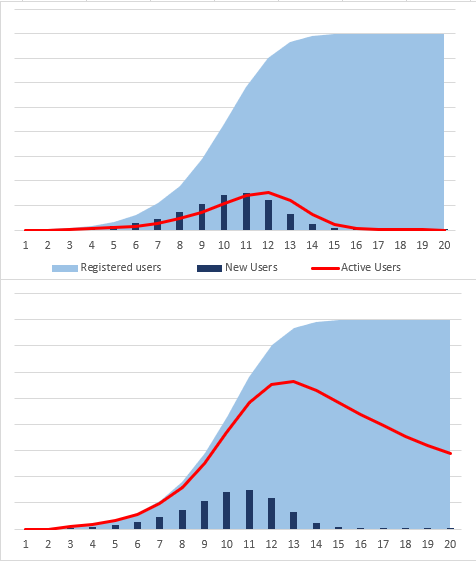- ARPDAUPosted 12 years ago
- What’s an impressive conversion rate? And other stats updatesPosted 12 years ago
- Your quick guide to metricsPosted 12 years ago
Complexity in layers: Free-to-play Design, rule 4
 Free-to-play games need to be accessible. That doesn’t mean that they have to be simple.
Free-to-play games need to be accessible. That doesn’t mean that they have to be simple.
Have you ever watched Toy Story? Or any Pixar movie? Have you watched it with a six year old child and discovered that he laughs at totally different things to the gags that you find funny? Marvelled at how layered Pixar was able to make its script?
Now it’s time to do that with your games.
You need a game that is simple to play but has depth and complexity that the player can unlock if they wish to.
Jetpack Joyride is a game that, on the surface, is about surviving for as a long as possibly by dodging obstacles as you proceed from left to right across the screen of your iPhone at a breakneck pace. It is also a game of collecting coins and fulfilling achievement objectives.
In practice, trying to collect coins may not be the best way to stay alive for a run. You might find a more effective way to play is sometimes to focus on collecting coins and sometimes to focus on staying alive as long as possible. You might play the game differently for a while just to collect some coins to acquire some new gadget that will help you stay alive for longer. You might vary your play style according to your own strategy for the game.
Similarly, you might play Pocket Planes simply for the fun of flying planes around, or you might spend time thinking about and discussing the best ways to optimise your airline, airports and flights to make the most amount of money in the smallest possible time, seeking out elusive bonuses and carefully planning the disposition of your fleet.
The most successful free-to-play games don’t punish their players. Everyone makes progress, just by turning up. But a dedicated player, who keeps trying to learn and improve, is rewarded with increased complexity.
Make sure you build complexity in layers.
The next post in the series will show why endlessly looping games are more successful in the freemium market














